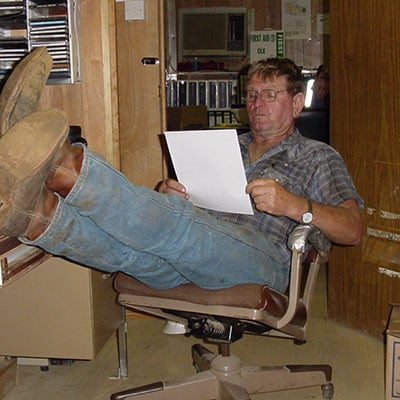

Murder on a Yemeni rig
For most families whose loved ones work on land-based drilling rigs in the Middle East, they send them off to work knowing that this might be the hitch where they get kidnapped, or the rig gets overtaken by rebels, or blown up in a terrorist attack. The odds aren’t in American workers’ favor for a peaceful hitch in the Middle East. And back in 2003, just weeks before President Bush began airstrikes in Iraq, tensions were running high throughout the region.
A company man, 64 years old, was working for a drilling operator and was in the middle of his hitch on March 18, 2003. The rig site at which he was stationed was in Yemen, in a rural part of the desert, and it was home to more than 40 Yemeni personnel and about 50 other people. There were also approximately 40 Yemeni military personnel whose job was to secure the rig site and protect the workers. That day started out like any other – everybody got up and went to work. For the company man, however, it would end horrifically.
Around mid-morning, a Yemeni employee of the drilling contractor started firing a 9 mm Russian Makarov pistol. He intentionally shot and wounded the rig mechanic, shot and killed the rig manager, shot and killed another employee of the drilling contractor, shot and killed the company man, and shot and killed himself.
Unreasonable risk of harm—security lapses created environment for killing spree
In the lawsuit, VB Attorneys alleged that the drilling contractor was aware of an unreasonable risk of harm based on the history of terrorism in Yemen, including the October 2000 bombing of the USS Cole and the escalation of violence in the region connected with the buildup to the US war in Iraq. In Vuk’s deposition of a representative of the drilling company, the corporate rep admitted that the company was aware of an unreasonable risk of harm, and that the company intentionally breached a provision in the drilling contract requiring it to provide security.
The lawsuit alleged that the drilling contractor failed to provide adequate security at the rig site by failing to provide security guards employed by the company. Research by security experts showed that the Yemeni military presence was akin to having no security at all – they could not be relied upon to protect foreigners from harm. The company man left behind a wife and four adult children, who were outraged that the shooting rampage had occurred and had brutally taken their loved one from them. They hired Vuk Vujasinovic, Brian Beckcom, and their team at VB Attorneys to pursue a lawsuit against the drilling contractor for premises liability and negligent supervision. Vuk and Brian brought a wrongful death case under Texas law, and Vuk, the lead attorney on the case, presented evidence that the deceased worker suffered significantly after being shot in the back. The family members also demanded compensation for lost wages, loss of future earning capacity, and loss of companionship.
The drilling contractor alleged that it did not retain control over security at the rig site. It asserted that the drilling operator (including the deceased company man) and the Yemen military jointly retained control over security, based on written agreements between those entities. The drilling contractor alleged it was not aware of any unreasonable risk of harm from its employees at the rig site, and that its employee – the shooter – did not present any risk of harm.
Drilling contractor sought to avoid case being tried in the United States
The drilling contractor did not want the case to proceed in the United States. It filed a motion to apply Yemeni law, which would have effectively barred VB Attorneys’ clients from recovering any damages. The parties filed over ten briefs on this issue, over a period of several months. At the conclusion of all the briefings and hearings, the motion was denied and the case stayed in Houston.
Next, the drilling contractor then filed a special appearance, denying it was subject to jurisdiction in Texas. After VB Attorneys engaged the drilling contractor in voluminous written and deposition discovery on the special appearance issue, the drilling contractor agreed to withdraw the special appearance motion and keep the case in Houston.
A further effort to try to avoid having to compensate the family of the deceased company man was to designate the shooter and the Yemeni military as responsible third parties. The goal was to reduce the amount of damages potentially owed by the drilling contractor. The Court did grant this designation.
Finding the truth about the gunman’s history
The family further alleged that the drilling contractor was negligent in its supervision of the gunman. Vuk and Brian’s investigation showed that the gunman not only suffered from mental illness and was taking valium prescribed by the rig medic, but that he used the narcotic substance “qat” at the drill site on a daily basis. The drilling contractor’s toxicologist expert admitted during his deposition that “qat” is an intoxicating and mind-altering substance that is also illegal in the United States. “Qat” is an illegal Schedule I substance under the U.S. Controlled Substances Act, the same categorization as heroin and LSD.
Further evidence came to light that the shooter was connected to Al Qaeda, was in possession of a gun at the work site for several months prior to the shooting, and was on record for stating that he was a victim of injustice at the hands of the oil companies.
Seeking justice: case goes to trial
In total, over thirty-five depositions were taken in the case, including four depositions in Dubai, United Arab Emirates. Other deposition sites included Boston, Denver, Oklahoma City, Dallas, and San Antonio.
A year and a half after the drilling contractor’s corporate rep was deposed by Vuk in Houston, where the rep admitted the company’s breach of contract, defense counsel arranged for the rep to give a trial deposition in Dubai. On cross-examination in Dubai, the corporate rep admitted that he made a “mistake” and was changing his Houston testimony on more than fifteen topics.
At trial, VB Attorneys called this corporate rep as their first witness in the case, using video evidence from his depositions. The Virginia Tech massacre occurred on the 11th day of trial, casting a pall over the country. On the 13th day of trial, the drilling contractor’s Field Superintendent completed his trial testimony. While on the stand, the Field Superintendent admitted the company violated various work policies which applied to the work site in question. In post-settlement interviews with jurors, two of the male jurors noted that they observed this witness throwing up in the bathroom on three different occasions. The case settled on the 14th day of trial, a day before VB Attorneys intended to rest their case.

